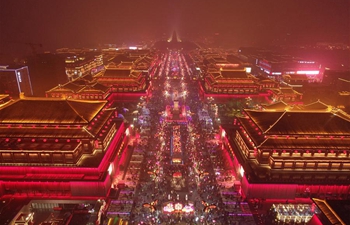ADDIS ABABA, Feb. 19 (Xinhua) -- In recent years, Chinese-constructed mega infrastructures connecting landlocked Ethiopia to Djibouti have become a driving force behind growing socioeconomic linkages between the two Horn of Africa countries.
Most recently, the two countries signed an agreement with Chinese petroleum giant Poly-GCL Petroleum Group Holdings Limited (Poly-GCL) to construct the 767-km Ethiopia-Djibouti natural gas pipeline.
NATURAL GAS PIPELINE
Following an agreement that was signed between the governments of Ethiopia and Djibouti with Poly-GCL, the Chinese petroleum company will install a pipeline to transport the recently discovered natural gas from landlocked Ethiopia to the Djibouti Port along the Red Sea.
The Ethiopian Ministry of Mines and Petroleum, revealing the signing of the agreement between the three parties over the weekend, said that the project, once it goes operational with the export of natural gas, will "immensely contribute" to the two countries' economy with the much needed foreign currency.
Construction of the 767-km natural gas pipeline, which is said to be finalized in two years, will have close to 700-km of the segment in Ethiopia, while the rest of the natural gas pipeline will be constructed in Djibouti's territory.
The Ethiopian government back in April last year had disclosed its plan to generate in excess of 1 billion U.S. dollars annually from the extraction of the 7 to 8 billion cubic trillion feet (TFC) of natural gas that was discovered by Poly-GCL in Ethiopia's Somali regional state.
According to Ethiopia's former Minister of Mines, Natural Gas and Petroleum Motuma Mekassa, Poly-GCL's engagement accompanied with the company's rich experience in the sector brings a positive advantage cognizant to the expensive nature of the processing procedures of natural gas.
"The gas discovery is a great phenomenon which is expected to make a meaningful contribution in sustaining the country's rapid economic growth in the years to come," Mekassa had said.
"We are expecting a 1-billion-U.S.-dollar revenue from gas export in the first year of operation, anticipating the figure would rise in the subsequent years due to the huge reserve," he added.
RAILWAY INTEGRATION
The much anticipated pipeline integration between the two historical allies is the latest move towards economic integration powered by the engagement of Chinese companies.
The 756-km Ethiopia-Djibouti railway, which officially commenced its commercial operations for both passenger and freight services in January last year, was considered as Ethiopia's long-term solution to its growing import-export demand.
Ethiopia, Africa's second populous nation with close to 104 million overall population, has over the past one year witnessed remarkable improvement in its freight services since the railway came to reality.
Contracted by two Chinese companies, the first 320 km of the rail project from Sebeta to Mieso was carried out by the China Rail Engineering Corporation (CREC), while the remaining 436 km from Mieso to Djibouti port section was built by the China Civil Engineering Construction Corporation (CCECC).
The railway, which is considered as the first trans-boundary and longest electrified railway on the African continent, is currently managed by a consortium of Chinese companies for a period of six years.
According to Tilahun Kassa, Director of the Ethiopia-Djibouti Standard Gauge Rail Transport Company, the linkage between the Djibouti port and Ethiopia's Modjo dry port on the outskirt of Ethiopia's capital Addis Ababa has shown early achievements, and is expected to further expand Ethiopia's export and international trading.
FOSTERING PEOPLE-TO-PEOPLE TIES
In addition to further enhancing the economic ties among Ethiopia and Djibouti and the eventual modernization of the transport system, the Ethiopia-Djibouti railway is also contributing to the people-to-people relations between the two countries, bringing much cheer and optimism among commuters.
Alemayehu Leyew, an Ethiopian passenger who is experiencing his first rail travel to Djibouti with his wife for recreation purpose, told Xinhua in a recent interview that the rail travel is much more comfortable than he previously thought.
"This is my first time to use a rail service for transportation," he said. "It feels great and it's also comfortable."
Leyew also urged scaling up the railway to connect other parts of the East African country, saying that "We need to scale up the rail transportation service into every corners of the country so as to speed up our country's modernization process."
Ethiopia, due to its lack of access to a major sea or ocean, heavily relies on the sea ports of Djibouti with 95 percent of its import and export commodities presently transported via the Port of Djibouti.
With a designed speed of 120-km per hour, the railway service has reduced the journey time from Djibouti port to Addis Ababa down from three days by road transport to less than 12 hours.
ROAD CONNECTIVITY
In addition to the electrified railway system, Chinese engagement has also contributed to Ethiopia's road connectivity to the Djibouti port, with the construction of 85-km expressway along the busiest section of the Ethiopia-Djibouti road infrastructure.
The six-lane 85-km expressway, which went operational in Sept. 2014 connecting Addis Ababa to Adama city, capital of Ethiopia's largest Oromia regional state, is by far the busiest segment of Ethiopia's vital road infrastructure linking the Addis Ababa to the port.
The expressway came to reality following the Ethiopian government's partnership with the Export-Import Bank of China (China Exim Bank) and the China Communications Construction Company (CCCC) in 2009.
According to figures from the Ethiopian Toll Roads Enterprise (ETRE), more than 22,000 vehicles are currently using the Addis Ababa-Adama expressway on a daily basis.
During the 2018 Ethiopian fiscal year alone, the toll road had served more than 7.8 million vehicles, eventually collecting close to 245 million Ethiopian birr (about 9 million U.S. dollars), according to ETRE.
As the demand increases, ETRE also expects some 8.8 million vehicles during the current fiscal year, with an expected income of 266 million Ethiopian birr (about 9.8 million dollars).













